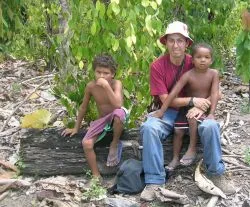Interview with Dr. Daniel Callo-Concha

Daniel Callo-Concha from Peru did his PhD research at ZEF from August 2004 until January 2009 on the topic of "Functional biodiversity in tropical agro-forestry systems". He received his PhD degree from the Faculty of Agriculture of the University of Bonn in February 2009 and was supervised by Profs Vlek (ZEF) and Janssens (Bonn University). His tutor was Dr. Denich (ZEF).
Why did you come to ZEF to do your PhD?
I came to ZEF because I wanted to do my PhD research on sustainable rural development and I was attracted by the international, interdisciplinary and intercultural set-up of ZEF.
Did your education at ZEF meet your expectations?
Yes, since ZEF's graduate program offers a high degree of flexibility concerning each student's profile and aims. This provides a great opportunity for a young researcher - to develop a career in a wished domain and on a specific topic. Thus, I collected academic strength by training and exposure, intercultural competences because of the ZEF atmosphere, and a more integrated insight into development issues.
Tell us something about your field research
I did my field research in Tomé-Açú, Pará, a northern State in Brazil, near where the Amazon River flows into the Atlantic. Although well-known by its natural beauty, the region is subject to constant ecological disturbance such as deforestation and intensive cattle-farming.
Even though I have worked in the tropics before, this was the first time to be in the core of it. Thus, I could perceive objectively the degree of risk we face concerning the environmental harming as well as our possibilities to cope with it.
Academicaly, it was a great challenge attempting to understand the complexity and scope of the problem and propose feasible alternatives; and personally, I had the luck to meet wonderful people in Brazil (and in Germany) whom furthered my enthusiasm for continuing my career on sustainable rural development.
What was the main outcome of your PhD research?
I've been looking at how alternative agricultural production systems can contribute to the conservation of natural resources and, at the meantime, fulfill land users' demands. I found out, that this is possible, under the condition that key factors are integrated into concepts and practices, factors such as: capacity-building, organization and market orientation, as well as encouraging the ecological processes e.g. diversity of useful species and biomass accumulation involved in the agricultural production process.
What are you going to do after graduation?
I want to continue my academic career, profiting from my education at ZEF, building on it while carrying out impact research for the developing world and in the future return to Latin America.
Mr. Callo-Concha, thank you for the interview.

